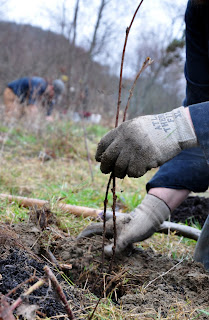Donning waders and counting fish
 |
| WCC AmeriCorps members record smolt trap data. Photo contributed by Paul Argites and Nick Saling. |
Sometimes, a day of service on these crews means donning hip waders and counting fish! Recently, AmeriCorps members helped build the City’s first smolt trap in Padden Creek. Smolt are juvenile salmon getting ready to migrate from fresh water to the ocean. Smolt traps temporarily and safely trap any fish migrating through a water passage. Our members learned the ins and outs of smolt trap construction, and continue to help monitor these traps. In Spring 2018, members recorded more than 3,689 juvenile fish in the Padden Creek trap in a single day!
Evaluating how fish are using a creek after habitat enhancement plays an important role in efforts to recover salmon. “This documentation benefits these species by informing future restoration designs as well as providing data to support funding future enhancement projects,” said Sara Brooke Benjamin, coordinator for Bellingham’s environmental monitoring program.
Daylighting Padden Creek
 |
| Our members installed more than 15,000 native plants as part of the Padden Creek Daylight project. Photo by WCC/Ecology. |
The smolt trap in Padden Creek help researchers learn about the effectiveness of the Padden Creek “daylighting” project. City of Bellingham re-routed a large section of the creek that had flowed through a concrete tunnel since the 1890s. The City constructed a nearly mile-long creek channel to replace the tunnel. Members kicked off the planting phase of the project, installing more than 15,000 native plants and ensuring freshly installed plants survived their first spring. The project has helped restore fish passage, improve water quality, and reduce flood risks for nearby residents.
WCC crews also conducted surveys for spawning salmon and their nests, called “redds.” During spring 2016, crew members walked about two miles of Padden Creek, searching for salmon and redds and recording data. Those surveys revealed that chum salmon can now access and are spawning in parts of the creek previously inaccessible to them!
Engaging the community
In addition to the restoration activities, community engagement plays an important role in project success. “The crews facilitated greater community understanding and participation by helping host three community work parties along our City streams,” said Analiese Burns, habitat restoration manager for City of Bellingham. “These crew members have contributed to our quality of life and in return, they leave with the skills necessary to continue their career of service.”
Watch a smolt trap in action
Visit City of Bellingham’s website to watch a short video on how smolt traps work, and visit Ecology's website to learn more about riparian restoration efforts in Whatcom County and statewide.
 |
| This could be your office! WCC AmeriCorps members serving in Skagit County take a lunch break. Photo contributed by Josh Boswell. |
Join WCC
We are currently accepting applications for 3-month member positions! Learn more and apply on our website. Ecology's Washington Conservation Corps, an AmeriCorps program, provides hands-on experience, field skills, and training opportunities to young adults between 18 and 25 and military veterans. WCC consists of three subprograms: the original WCC, Veteran Conservation Corps and Puget SoundCorps.

No comments:
Post a Comment